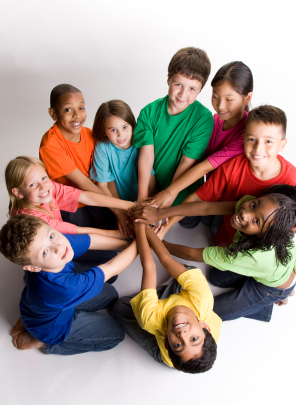News and Notes from The Johnson Center
What Is A Social Skills Group?
JCCHD | Thu, November 20, 2014 | [Applied Behavior Analysis][Autism Treatment][Community][Q and A ]A social skills group is a valuable resource for building social skills for people with autism spectrum disorders. The group setting allows for participants to connect with peers and practice social skills, and provides the opportunity for modeling, role-play, and feedback. Groups usually include at least one facilitator, with three to ten group members of similar age and with similar goals. Sometimes typically developing peers are also involved in the group. Additionally, many programs include a parent group to help facilitate the generalization of skills learned to the home environment. Social skills groups can be geared towards any age group and level of social-skill functioning. For example, a group might consist of pre-school age children with emerging social skills, or
young adults who are higher functioning.
Are there certain curriculums or manuals that groups should follow?
Many groups follow a social skills curriculum or manual. One curriculum that has a strong evidence base is the PEERS program (Program for the Education and Enrichment of Relational Skills), which was developed at UCLA by Dr. Elizabeth Laugeson. The program is for adolescents and young adults with ASD. Groups are provided out of the UCLA peers clinic, as well as in other areas of the US. Manuals and books on how to apply the PEERS program can be found on their website, including a manual for teens, a manual for school-based professionals, and a book for parents and professionals called “The Science of Making Friends.” The UCLA PEERS clinic also offers training for group facilitators. Some examples of the types of skills that are targeted in the adolescent/teen group include: conversation skills, finding common interests, handling disagreements, and dealing with teasing.
An additional curriculum used for teaching social skills is the Social Thinking curriculum by Michelle Garcia Winner. Social Thinking is a concept that describes perspective-taking and how it impacts our social behavior and emotions. Several different workbooks that follow the Social Thinking methodology are available and can be integrated into social skills groups. Workshops and trainings are also available to professionals who want to utilize the principles of Social Thinking in their work.
Social Stories, created by Carol Gray, is an educational tool that can be integrated into a social skills group. Social Stories use a defined format to help model social scenarios that can help individuals with ASD identify important social information such as social cues and perspectives, and suggest responses.

How do I find a social skills group?
Social skills groups can be led by a variety of professionals; for example, Applied Behavior Analysts, Psychologists, and Speech and Language Pathologists. It is always helpful to get referrals from a reliable source, such as your child’s therapists. Parents might consider researching local autism-specific clinics, ABA clinics, or speech therapy offices to see if any offer social skills groups. Additionally, a simple internet search can display social skills groups in your area.
What makes a good social skills group?
The group should consist of similarly aged (both chronological and developmental) children with consistent social goals. It is always beneficial for parents to be involved to support generalization and the maintenance of skills learned. Applied Behavior Analysis is a highly evidenced intervention for individuals with ASD. Therefore, social skills groups that are facilitated by experienced ABA professionals are typically a reliable source for groups. Social skills groups should meet regularly, at least weekly, and for a sufficient amount of time, typically 12-16 weeks.
Krasney and colleagues (2003) reviewed existing literature on social skills groups and suggest the following guidelines for a well-run group:
- Teach concepts in a concrete manner
- Provide structure and predictability
- Simplify language and group children by level of language
- Provide numerous and diverse learning opportunities
- Include activities that require group work and cooperation
- Build self-awareness and self-esteem
- Set meaningful goals
- Teach goals successively
- Support generalization and maintenance of skills learned to relevant environments
What resources can help me learn more about social skills and social skills groups?
UCLA Peers Program: http://www.semel.ucla.edu/peers/teens
Social Thinking Curriculum by Michelle Garcia Winner: http://www.socialthinking.com
Social Stories by Carol Gray: http://www.thegraycenter.org; www.carolgraysocialstories.com
Autism Speaks: Social Skills and Autism http://www.autismspeaks.org/family-services/community-connections/social-skills-and-autism
Duke, M., Nowicki, S., Martin, E. & Holifield, V. (1996). Teaching Your Child the Language of Social Success. Atlanta, GA: Peachtree Publishing Ltd.
Taubman, M., Leaf, R. & Mceachin, J. (2011) Crafting connections: Contemporary Applied Behavior Analysis for enriching the social lives of persons with Autism Spectrum Disorder. New York: DRL Books
Smith, M. (2001). Teaching Play Skills to Children with Autism Spectrum Disorder. New York: DRL Books.
Krasny, L., Williams, B. J., Provencal, S., & Ozonoff, S. (2003). Social skills interventions for the autism spectrum: Essential ingredients and a model curriculum. Child and Adolescent Psychiatric Clinics of North America, 12(1), 107-122



